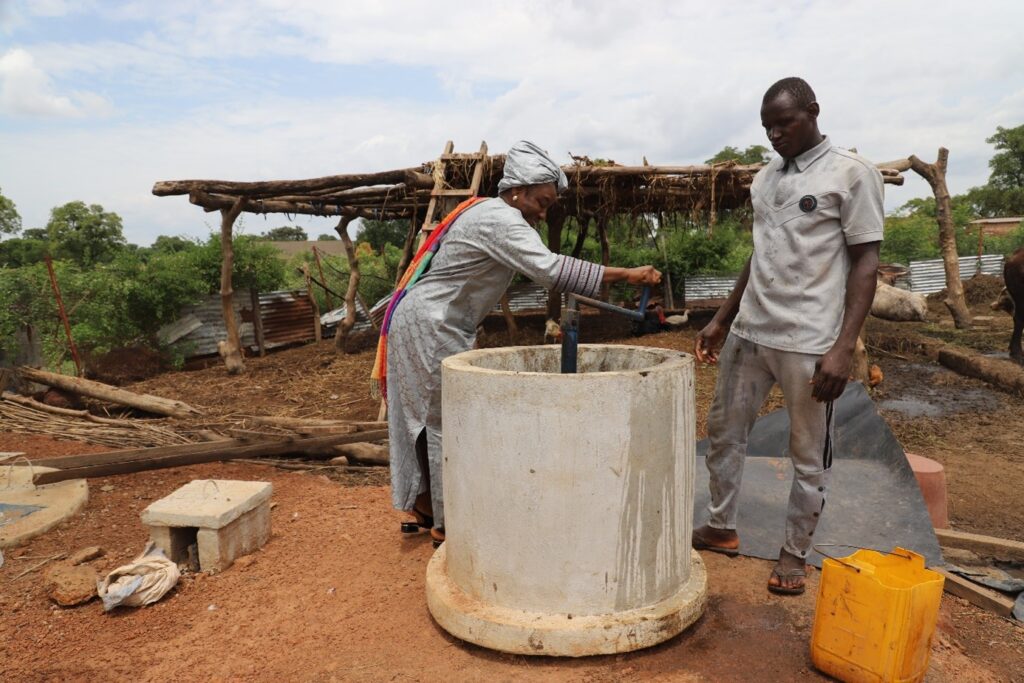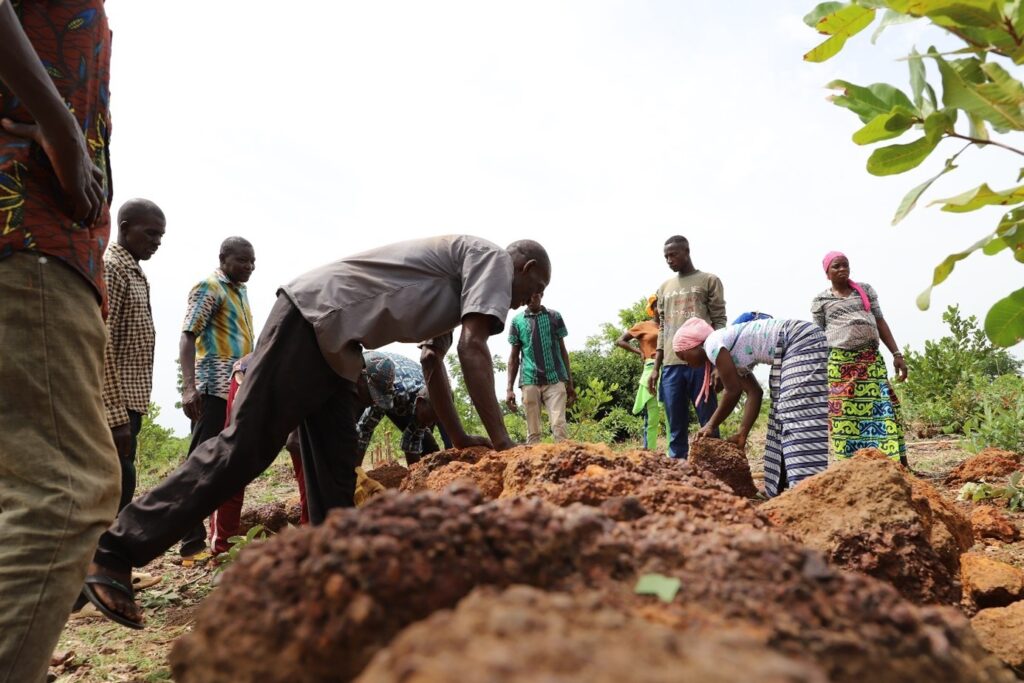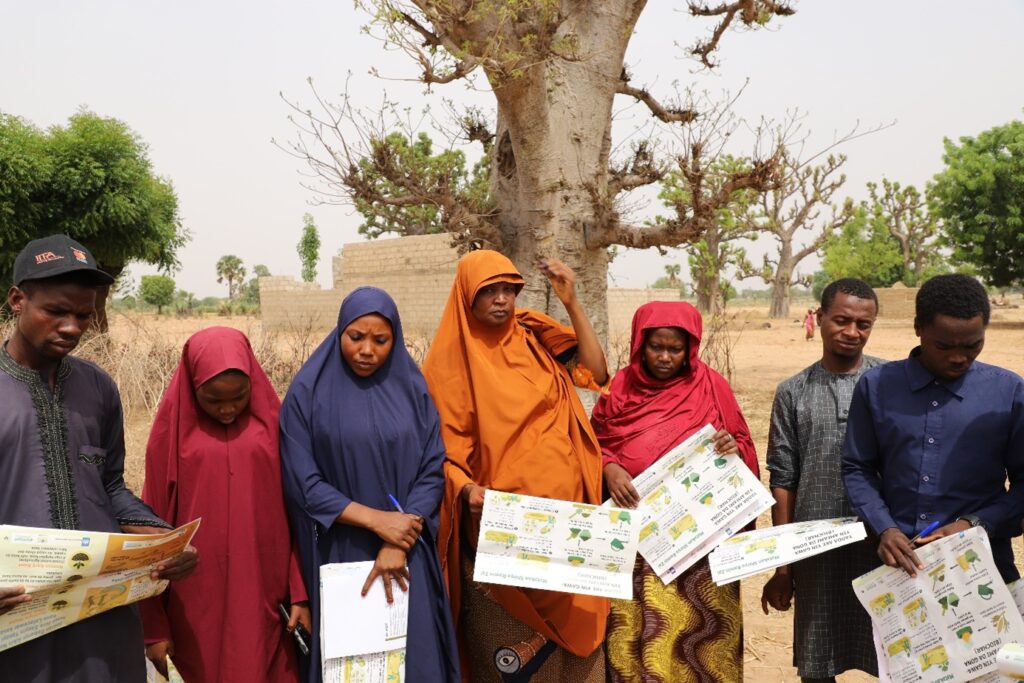
The Soil Values program is rolling out a series of innovative initiatives across the Sahel to promote integrated soil fertility management (ISFM), build the capacity of rural stakeholders, disseminate appropriate, useful technologies to smallholder farmers, and advance social inclusion.
From Mali and Nigeria, to Burkina Faso and Niger, the program is deploying a cascade approach to strengthen soil health. These and other actions are helping to build a more resilient, sustainable, and inclusive agriculture sector in the face of climatic, economic, and social challenges.
“Producing our own organic fertilizer is a considerable advantage, allowing us to maintain more sustainable and productive farms.”
Bintou Ouattara, Project relay farmer
At the heart of the Soil Values strategy is cascade training, a method that allows for the rapid dissemination of knowledge on ISFM. The program organized cascade training sessions to strengthen the technical knowledge of extension agents, agricultural district leaders, and farmer leaders on soil fertility, mineral and organic fertilizers, compost, bokashi1, biochar2, assisted natural regeneration3, zaï4 and other agroecological practices adapted to local conditions.
In Mali, this approach targeted the Sikasso and Bani watersheds, where agents and farmer leaders were trained. These participants, or relay farmers, in turn became vectors of knowledge for their communities, passing on essential knowledge about agroecological practices they had learned.
This cascade training initiative has been welcomed by local authorities, such as Alkassoum Barka, the Regional Director of Agriculture in Sikasso, who recognized the program’s considerable impact. In Burkina Faso and Nigeria, similar training courses have enabled farmers to learn how to produce their own organic fertilizers and use technologies such as fertilizer deep placement (FDP) to optimize yields.
Farmers’ testimonials illustrate the impact of these training courses. In Burkina Faso, a relay farmer, Bintou Ouattara, remarked, “Producing our own organic fertilizer is a considerable advantage, allowing us to maintain more sustainable and productive farms.”
In Nigeria, Soil Values training courses have introduced FDP technology, which improves soil fertility and rice and tomato yields while reducing losses. In Mali, the construction of 15 biodigesters5 in Sikasso is paving the way for circular agriculture, encouraging the production of biogas for households and organic fertilizer for fields.

In addition, the Soil Values program is developing bundled services combining technical support, financing, inputs, markets, and digital tools to improve productivity and strengthen resilience.
Recognizing that soil degradation is a complex issue, the program takes a landscape-level approach. Led by the Center for International Forestry Research and World Agroforestry (CIFOR-ICRAF), the program works on sustainable watershed management, integrating local knowledge and agroforestry practices.
Participatory workshops in Mali have involved communities in mapping and identifying solutions tailored to their contexts, while addressing challenges such as soil erosion and water scarcity.
With support from CIFOR-ICRAF, Soil Values is addressing sustainable watershed management for food security and ecological resilience. Participatory workshops and local studies are used to identify appropriate agroforestry solutions, such as agro-silvopastoral systems6 and windbreaks. Eight priority watersheds have been selected from among the four countries to test these approaches.

The Soil Values program also incorporates gender equality and social inclusion. In April, a workshop held in Bobo-Dioulasso, Burkina Faso, enabled partners to co-develop analytical tools for their specific agricultural context and to reflect on leveraging strategies for more equitable access to land, inputs, and seeds.
The program also participated in the United Nation’s 16 Days of Activism Against Gender-Based Violence campaign last year, mobilizing farming communities in the Sahel and reminding them that sustainability also requires a safe and inclusive environment for women and young people.
The Soil Values program is establishing itself as a catalytic platform, combining local knowledge with scientific innovation to make the Sahel a pioneer in sustainable agriculture.
Funded by the Dutch Directorate-General for International Cooperation (DGIS), the Soil Values program is being implemented over 10 years (2024-2033), led by the International Fertilizer Development Center (IFDC), in consortium with SNV and Wageningen University and Research (WUR), as well as knowledge partners such as AGRA, the Center for International Forestry Research and World Agroforestry (CIFOR-ICRAF), the International Institute of Tropical Agriculture (IITA), ISRIC – World Soil Information, and the International Water Management Institute (IWMI).
- Bokashi is a process that converts food waste and similar organic matter into a soil amendment which adds nutrients and improves soil texture. ↩︎
- Biochar is a carbon-rich material produced from the thermochemical conversion of biomass in an oxygen-limited environment. It is made from agricultural residues, wood waste, and other organic materials, and is applied to improve soil health and fertility. ↩︎
- Assisted Natural Regeneration is a cost-effective forest restoration method that enhances the natural recovery of degraded ecosystems by removing barriers to regeneration. ↩︎
- Zaï is a farming technique of digging pits in less permeable soil to catch water and concentrate compost. ↩︎
- A biodigester is a device that converts organic waste into biogas and natural fertilizer through anaerobic digestion. ↩︎
- Agro-silvopastoral systems is a collective term for land-use systems, which combine a woody component (trees or shrubs) with cattle on the same site. ↩︎




